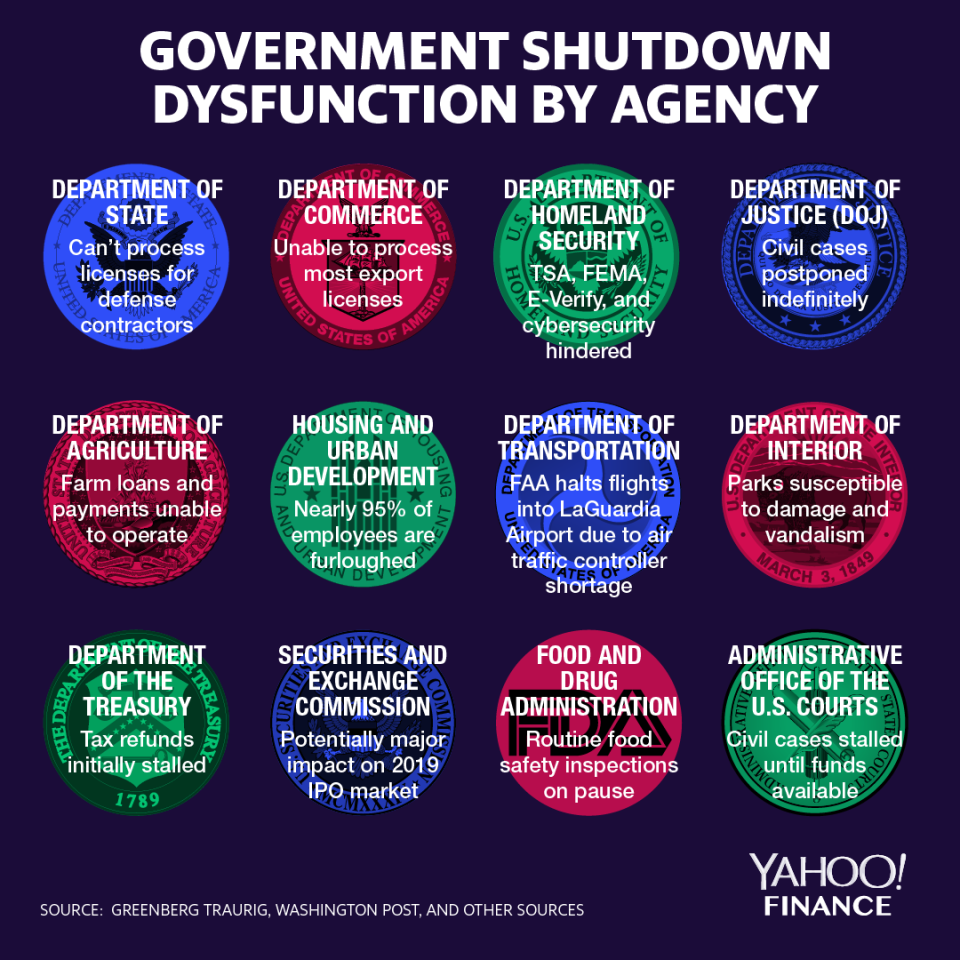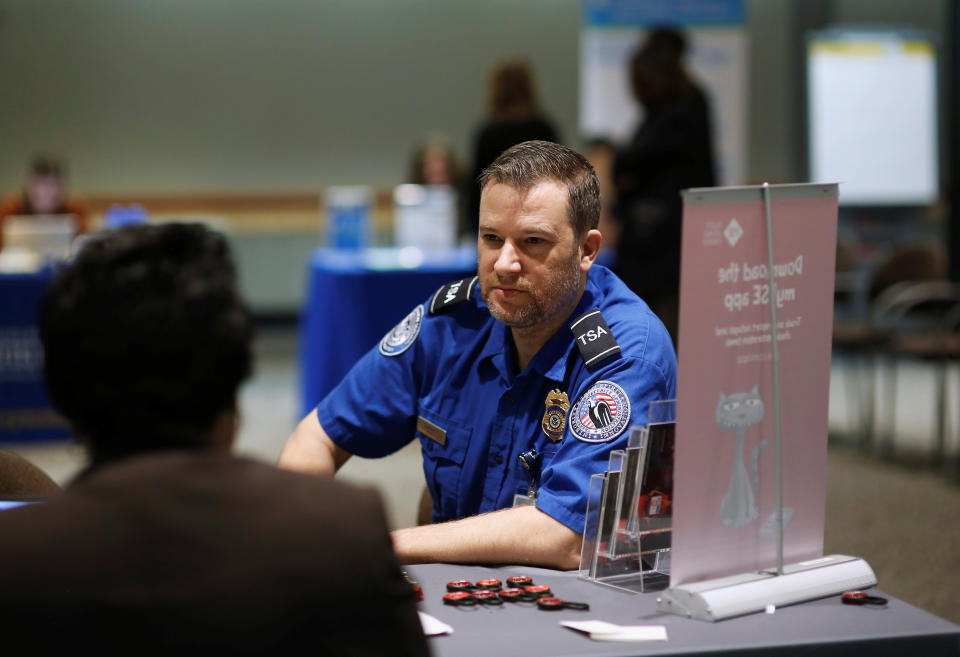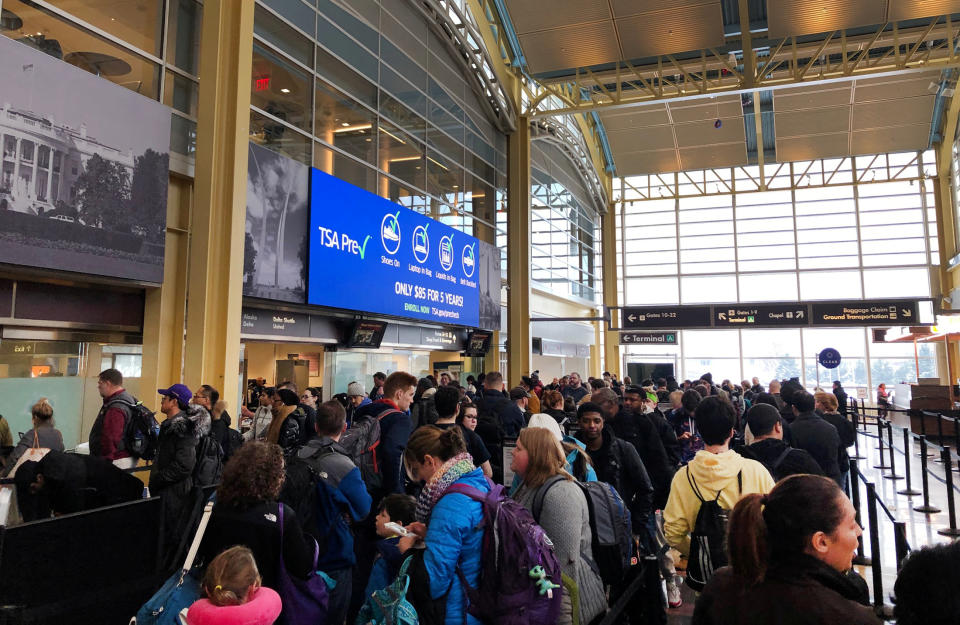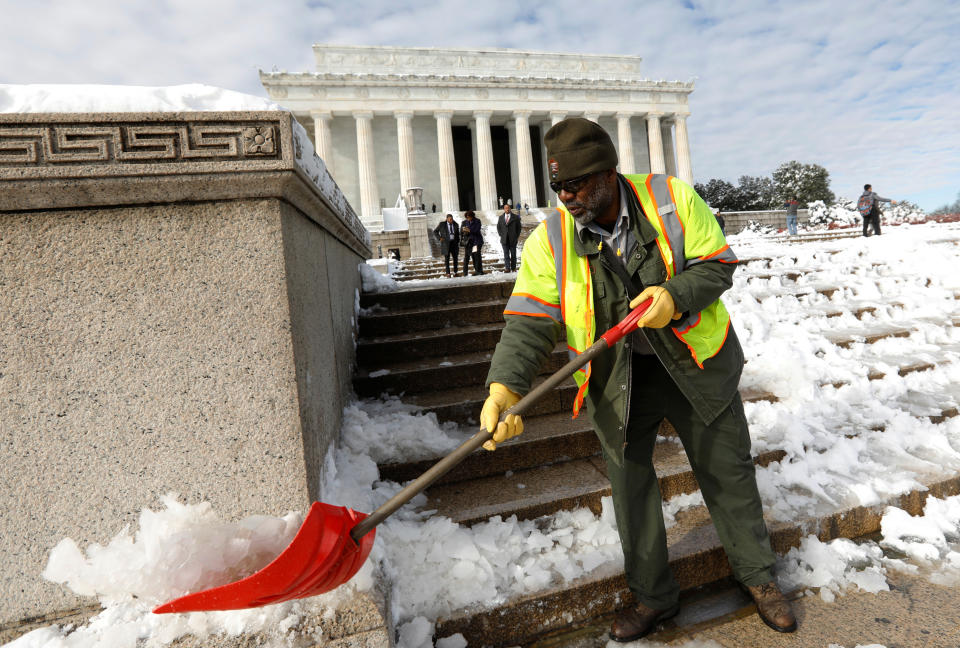How government shutdown dysfunction is hitting key U.S. agencies
This post has been updated.
The government shutdown is the longest in American history, as it continues on with no end in sight. With tens of thousands of federal workers furloughed or forced to work without pay, the effects of the shutdown are trickling down from the basic agency level.
Prior to the shutdown, three-quarters of government agencies were already funded throughout the year from other appropriations. As a result, the Departments of Labor, Health and Human Services, and Defense haven’t been affected.
However, other government agencies hit by the shutdown are struggling as time goes on. Below are some of the other most significant impacts on government agencies, partially based on data provided to Yahoo Finance by D.C.-based law firm Greenberg Traurig.

Department of Transportation
On Friday, Jan. 25, the FAA announced that it was halting flights into LaGuardia Airport in New York as a result of a shortage in air traffic controllers. As a result, flights were reportedly delayed in Newark, Philadelphia, Washington D.C., and Jacksonville.
In a statement to Yahoo Finance, an FAA spokesman said: “We have experienced a slight increase in sick leave at two facilities. We’ve mitigated the impact by augmenting staffing, rerouting traffic, and increasing spacing between aircraft when needed. The results have been minimal impacts to efficiency while maintaining consistent levels of safety in the national airspace system.”
Within an hour, the FAA stated that it was allowing flights to resume.
The FAA has nearly 17,800 employees on furlough. Within the Federal Transit Administration (FTA), only 11% of its employees are working during the shutdown.
Transportation funding is also on hold. According to the Washington Post, “only a quarter of the $44 billion for highway projects and $11 billion in federal transit programs was paid at the outset of the fiscal year.”
The lack of paychecks has led to Transportation employees losing an average of $7,527 in wages, according to the Times.
Department of the Treasury

Within the IRS, 90% of its workers were furloughed when the shutdown began. Tax refunds were initially stalled because there were no workers available to process them.
However, after it was decided that tax refunds would still be issued, some employees were brought back in. They will not be paid until the shutdown ends, though. Because of that, some IRS employees are using a provision in their union contract “that allows them to miss work if they suffer a ‘hardship’ during a shutdown,” such as an empty gas tank or child-care bill.
And, since this is the time that employees begin processing tax refunds, this could cause major delays in people receiving them. If that were to happen, Credit Suisse analysts noted that this could “cause a sharp decline” in retail sales and consumer spending in February.
Department of Homeland Security (DHS)

Most operations with DHS remain fully functioning, with the exception of the Cybersecurity and Infrastructure Security Agency and the DHS Science and Technology Directorate. The latter supports development and research within DHS.
The Cybersecurity and Infrastructure Security Agency was launched only in late 2018 to identify threats to American physical and cyberinfrastructure. The agency is currently operating with 43% fewer staff, which has raised concerns that the government is more vulnerable to cybersecurity threats.
TSA employees are being forced to work without pay, although many have begun protesting by calling out sick and refusing to come to work. This has begun to affect travelers, who are forced to wait in long lines because of limited security checkpoints.
In an effort to retain as many TSA employees as possible, it was announced that airport screeners and other agency employees will begin to receive partial pay. It will amount to slightly less than half a paycheck, according to CNBC.

The E-Verify System, which is operated by both DHS and the U.S. Citizenship and Immigration Services, has been offline since the onset of the shutdown. The program is used to help employers prevent immigrants from working for them illegally.
The Federal Emergency Management Agency, commonly known as FEMA, has not seen a change in emergency funding from the shutdown. It has, however, been forced to halt the work of its government contractors.
The executive vice president of the Professional Services Council, Alan Chvotkin, told the Washington Post that the “shutdown threatens to damage the industry of disaster preparedness and response [of] professionals that contract with FEMA.”
He added, “Companies are naturally going to do what they can to protect their employees, but it’s hard to keep them on idle standby waiting to be recalled. The longer the shutdown goes, the more difficult it is to reassemble these teams.”
Homeland Security employees have lost an average of $5,895 in wages since the shutdown began, according to the Times.
The Departments of State and Commerce
Both the State and Commerce Departments are blocked from processing the majority of export licenses during the shutdown.
Aerospace Industries Association CEO Eric Fanning told the Washington Post that these licenses are needed for defense contractors to sell military hardware overseas. These contractors have been unable to apply for new licenses since the shutdown began on Dec. 22.
When the shutdown first began, the State Department’s Directorate of Defense Trade Controls issued a notice that stated that “contractors that provide ‘direct support to the military, humanitarian aid, or other similar emergencies’ can apply for an emergency license,” according to the note.
Because these defense contractors are unable to report for work, research projects at the FAA, NASA, and NOAA have been delayed.
And, so far in the shutdown, according to a New York Times analysis, furloughed Commerce employees have lost an average of $6,324 in wages.
Government agencies hit by the shutdown include the DOJ
Although criminal cases are uninterrupted, many civil cases are being postponed indefinitely. This includes those before the Court of Federal Claims, which is used for plaintiffs seeking monetary damages against the U.S. government.

Administrative Office of the U.S. Courts
According to the Administrative Office of the U.S. Courts, “some federal courts have issued orders suspending, postponing, or holding in abeyance civil cases in which the government is a party for a limited period, subject to further consideration, or until appropriated funds become available. Such orders are published on court internet sites.”
The Administrative Office “provides a broad range of legislative, legal, financial, technology, management, administrative, and program support services to federal courts.” In addition, it also carries out Judicial Conference policies and provides staff support and counsel to the Judicial Conference and its committees.
The office estimates that it will run out of non-appropriated funds after Jan. 25. If that happens, “the Judiciary will operate under the terms of the Anti-Deficiency Act, which allows ‘essential work’ to continue during a lapse in appropriations.”
The average salary lost for these employees was not available.
Department of Housing and Urban Development (HUD)
Nearly 95% of HUD’s 7,500 employees are currently furloughed without pay, according to the department’s 2018 contingency plan. Many of its operations have been affected, including its mandatory health and safety inspections.
“Some of the money goes to housing for the most vulnerable households in this country,” a California-based HUD employee told NBC News. “If there is the smallest glitch in the process, there’s going to be a problem. We work day in and day out to resolve these problems.”
HUD employees have lost an average of $7,332 in wages since the shutdown began, according to the Times.

Department of Agriculture (USDA)
The USDA is still carrying out many activities for the time being, including inspection services for meat, poultry, and processed eggs, SNAP benefits, child nutrition programs, Market Facilitation Program payments, and Market News Service.
Activities that cannot operate due to the lapse in funding include new rural development loans and grants, agricultural economic and statistical reports and projections, farm loans and some farm payments, and agricultural research facilities.
Since the shutdown began, USDA employees have lost an average of $4,446 in wages, according to the Times.
Department of Interior

The National Parks Service is keeping parks open to visitors, despite not cleaning up trash from these parks. In a Twitter thread, a former Interior employee detailed the harmful effects of keeping parks open during a government shutdown. He cited the lack of park rangers, trash, damage to sensitive habitats and landmarks, and more.
As someone who worked @interior during the shutdown in 2011, let me tell you how dangerous this is. https://t.co/hiGTsyfb6N
— Tim Fullerton (@TimFullerton) December 22, 2018
Since the shutdown began, Interior employees have lost an average of $4,664 in wages, according to the Times.
Securities and Exchange Commission (SEC)
There are 4,436 SEC employees, and only about 285 of them are still working. The lack of workers has led to a backlog of filings “that could cause a delay in several IPOs, as well as a lasting impact on the state of the IPO market in 2019,” according to TechCrunch.
SEC employees have missed an average of $12,543 in lost wages since the start of the shutdown, according to the Times. That the highest for government agencies hit by the shutdown listed here.
Food and Drug Administration (FDA)
Nearly 40% of the FDA’s 10,000+ employees are furloughed in the shutdown.
On Jan. 9, news surfaced that the Food and Drug Administration (FDA) stopped routine food safety inspections because of the shutdown. This includes “seafoods, fruits, vegetables, and many other foods at high risk of contamination,” the New York Times reported.
Meat and poultry were exempt from this since both are monitored by the Department of Agriculture, which is still functioning.
The average FDA wages lost in the shutdown was not available.
Other agencies affected by the shutdown include, but are not limited to: NASA, EPA, the National Institute of Standards and Technology, Commodity Futures Trading Commission, General Services Administration, the Federal Trade Commission, Office of Government Ethics, Small Business Administration, and the U.S. Agency for International Development.
Adriana is an associate editor for Yahoo Finance. Follow her on Twitter @adrianambells.
READ MORE:
A running list of problems caused by the longest-ever U.S. government shutdown
Federal employees are increasingly concerned about a long shutdown
The government shutdown is hitting these U.S. states the hardest
Follow Yahoo Finance on Twitter, Facebook, Instagram, Flipboard, LinkedIn, YouTube, and reddit.

 Yahoo Finance
Yahoo Finance 
